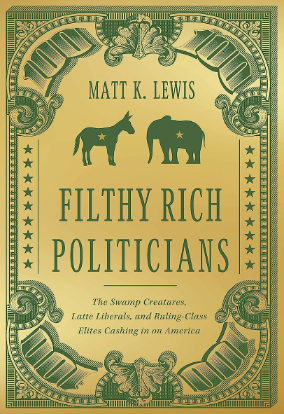Matt K. Lewis’ new book highlights partisan politicians benefiting greatly—politically and even personally—from a tax-exempt, nonprofit, charitable organization.
The Daily Beast columnist Matt K. Lewis’ new book Filthy Rich Politicians: The Swamp Creatures, Latte Liberals, and Ruling-Class Elites Cashing in on America includes material on the funding and activities of the Clinton Foundation, an organization categorized as a tax-exempt, nonprofit charity under §501(c)(3) of the U.S. Internal Revenue Code.

“The Clinton Foundation,” according to Lewis, “is a bit unique. Plenty of politicians start organizations when they leave office, but few (if any) have matched the profile and reach of the Clinton Foundation.”
An outgrowth of the foundation first formed by Bill Clinton in 1997 to help with his presidential library—and typical of the way in which such post-presidency libraries are set up—”the Clinton Foundation evolved into a network of groups funding and executing philanthropic initiatives around the world,” Lewis recounts.
The past and potential future Presidents’ foundation
Bill Clinton’s two presidential terms ended in January 2001. “Between 2001 and 2015—predating Hillary Clinton’s presidential campaign but overlapping her stint as secretary of state” during President Barack Obama’s administration—the Clinton Foundation “raised an estimated $2 billion,” Lewis writes. “Most of that (an estimated 97 percent) stayed with the foundation—which is another way of saying they did their own work rather than acting as a pass-through to other charities. And as a charitable organization, the foundation could take donations from anyone, with no limits attached.”
The foundation only began providing information about its donors “in December of 2008 in order to avoid conflict of interest allegations during Hillary Clinton’s secretary of state confirmation,” according to Lewis.
Leading up to Hillary Clinton’s ultimately unsuccessful 2016 presidential campaign, “half the donors from her proto-campaign group, Ready for Hillary, had contributed $10,000 or more to the foundation,” reports Lewis, citing a Washington Post article (all endnotes omitted.) “Furthermore, one-third of the foundation’s donors who contributed $1 million or more were foreign governments or entities.” Financial institutions and other monied interests also “wanted to be Hillary Clinton’s friend;” they donated to the Secretary of State’s and potential future President’s foundation, too. Why?
Charity?
“For other politicians,” Lewis notes, “the caginess and lack of explanations might suggest something nefarious.”
Optics and allegations, confusion and the like
Later in Filthy Rich Politicians, Lewis returns to the Clinton Foundation. “[E]ven if you put aside the optics and allegations, the Clinton Foundation also demonstrates how messy this business can be and how ostensibly charitable activities can result in profit for the principal,” as Lewis puts it.
Citing USA Today reporting, Lewis quotes a 2011 memorandum—part of an internal Clinton Foundation audit—in which longtime Bill Clinton aide and paid consultant Doug Band writes of the confused interrelationship between the foundation and the financial interests of the past President. In the memo, Band describes how some foundation donors (some of whom were also his consulting clients) also paid Clinton personally for various things.
“Independent of our fundraising and decision-making activities on behalf of the Foundation,” according to Band’s memo,
we have dedicated ourselves to helping the President secure and engage in for-profit activities—including speeches, books, and advisory service engagements. In that context, we have in effect served as agents, lawyers, managers, and implementers to secure speaking, business and advisory service deals. In support of the President’s for-profit activity, we have also solicited and obtained, as appropriate, in-kind services for the President and his family for personal travel, hospitality, vacation and the like.
Not charity.



